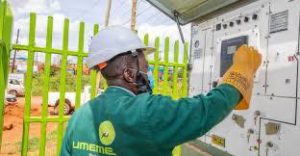
#OutToLunch: Favourable interest rates are good for everyone, not just government
By Denis Jjuuko Now that the hullabaloo about the government takeover of Umeme is over, there is a need to ask some questions. Questions that affect most people. As you might be aware, many businesses survive on loans whether to expand, acquire new technology, or service their customers. Usually, the big businesses easily walk into a bank and get whatever money they need. Some even advertise calling lenders who would like to lend them money to bid. The lenders sometimes fall for themselves to do so. Government does the same. It even sets the interest rate it will borrow at and many times even refuse some of the money people are desperate to lend to it but to this, we shall return later. For the small and medium enterprises (SMEs), it is a totally different story. You have to chase the lenders to give you money. Their instinct is to refuse. They claim SMEs, even when collectively are the biggest contributors to the economy, are risky. Chances of not getting their money back are high. They may not be entirely wrong. The lenders especially the formal ones usually take their time, making the borrowers even more desperate sending them to underground sharks. Some times some staff of the formal lenders are not any different from the sharks. They deliberately slow the process and demand stuff that are as difficult to get as those usually required by witches. Once they realize the borrower is super desperate, they pounce many times asking anxious SMEs for a commission. Imagine borrowing money at interest rates in their mid-twenties and somebody is asking for a commission on it. The commission is usually euphemism for a bribe. Desperate SME owners give the bribe in fear of losing out. Doing business in Uganda is like living in the wild, always looking over your shoulders for predators. Yet the say that what is good for the goose should be good for the gander too. Let us look at how government paid off Umeme. We heard that they borrowed money from a commercial bank to pay Umeme. The lender didn’t quote them the usual rates. It lent them at 7% annually. I am not sure if they presented any collaterals. I believe they didn’t. Currently, the average interest rate on dollar loans is 13% in many commercial banks. So, the government negotiated itself a bargain at 7%. When they are borrowing from the masses through the treasury bonds, they are giving an average of 15% on long term bonds (10-20 years) and much less on those with short tenures (five years and below). Like mentioned earlier, they many times refuse to take all the money people are willing to lend it. They perfectly understand that high interest rates are not good for them. But if they are not good for them, how can they be good for businesses and individuals? Newspapers these days seem to be deriving most of their income from adverts putting borrowers’ assets on sale by auction for failure to pay back loans. The majority of those assets are for small businesses and individuals. It can’t be that they all misused the money and went for life or made extremely wrong decisions. Some could have been because the government itself has not paid them for supplies and services rendered for years, prompting lenders to send the toughest auctioneers their way. With the Americans closing agencies like USAID, many businesses in Uganda are going to collapse if they have not collapsed already sending thousands of workers and business owners home. At their homes, auctioneers will show up to do foreclosures on mortgages. Imagine somebody who acquired assets to service the thousands of NGOs that were getting grants from USAID? Such businesses had not yet recovered from the closure of the Democratic Governance Facility (DGF) by the Ugandan government. We had not yet recovered from COVID-19 for God’s sake. And as we prepare for elections in 2026, many investors will be watching from the sidelines to see what happens. This means investing less money and therefore less jobs or income for small businesses that could have supplied them or gained contracts from the value chains. Regardless of what happened with USAID, DGF or what will happen during elections, government needs to rethink seriously the interests on loans and work out a long-term solution. They can’t be borrowing at favourable rates while sending the rest to borrow at astronomical figures. The writer is a communication and visibility consultant. djjuuko@gmail.com

